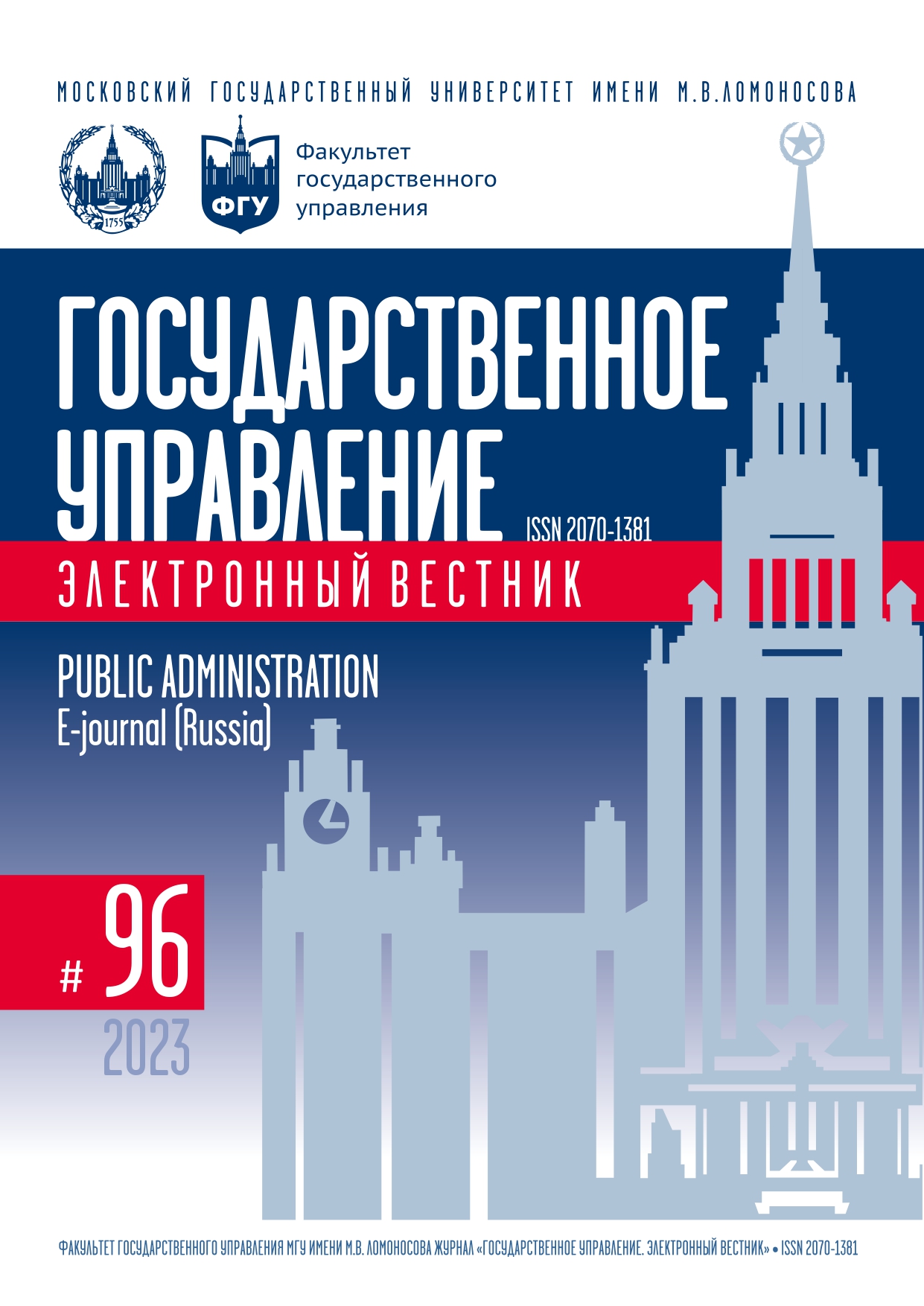The Nagorno-Karabakh Conflict: Particularities of International Settlement Process and Russia’s Involvement in It (1991–2022)
Keywords:
Ethnopolitical conflict, Nagorno-Karabakh conflict, form of participation, means of participation, conflict settlement, political settlementAbstract
Over the past three decades, the problems of resolving ethno-political conflicts in the post-Soviet space, in particular, the Nagorno-Karabakh conflict, in which Russia is an active participant in the political settlement, have been of particular relevance. The aim of the article is to determine the forms and mechanisms of Russia’s participation as a third party in the settlement of the conflict in Nagorno-Karabakh. The article identifies the main causes of the conflict in this region. Based on the literature review, the main forms and mechanisms of participation of a third party in the settlement of the ethno-political conflict, as well as the attitude of researchers to the role of Russia in the settlement of the conflict in the South Caucasus, are highlighted. The participation of Russia in the settlement of the Nagorno-Karabakh conflict throughout the entire period of its existence is described in detail. It was determined that over the past thirty years, Russia has used various negotiation and communication mechanisms aimed at a peaceful solution to the Nagorno-Karabakh conflict. However, at the same time, Russia benefits from the frozen format of the Nagorno-Karabakh conflict, which is an opportunity to maintain friendly relations with both Armenia and Azerbaijan, while maintaining neutrality towards any of the parties. While acting as a mediator in the conflict, Russia aimed to create a positive image and maintain a balanced relationship with the warring parties, while failing to fully control the situation in the region and allowing the Nagorno-Karabakh conflict to escalate into a war. Further peaceful settlement of the conflict in Nagorno-Karabakh is possible with a change in the attitude of both the conflicting parties and Russia, acting as a mediator, to the depth of the conflict and the need for a compromise solution.
References
Гайдук В.В., Смирнова К.И. Этнополитические конфликты на постсоветском пространстве // Вопросы национальных и федеративных отношений. 2013. № 2(21). С. 79–87.
Карсанова Е.С. Этнополитические конфликты: проблемы и опыт политико-правового регулирования. М.: Международный юридический институт при Минюсте РФ, 2008.
Маслакова-Клауберг Н.И., Садыкова Э.Л. Обострение ситуации в нагорном Карабахе как геополитический вызов // Вестник института мировых цивилизаций. 2020. Т. 11. № 3(28). С. 51–57.
Султыгов А.-Х.А. Этнополитические противоречия и формы их разрешения: исторический опыт и современные реалии. М.: Макс Пресс, 2016.
Феномен этнического конфликта: междисциплинарный подход и общественные практики. Опыт предупреждения и урегулирования конфликтов / под ред. В.А. Тишкова, В.В. Степанова. Москва: ИЭА РАН, 2018.
Хазанов Н.А. Политические практики регулирования межэтнических отношений в регионе // Регионология. 2015. № 2. С. 31–40.
Minasyan S. The Nagorno-Karabakh Conflict in the Context of South Caucasus Regional Security Issues: An Armenian Perspective // Nationalities Papers. 2017. Vol. 45. Is. 1. P. 131–139. DOI: 10.1080/00905992.2016.1237938
Waal T. The Nagorny Karabakh Conflict in Its Fourth Decade // CEPS Working Document. 2021. No. 2021–02. URL: https://www.ceps.eu/ceps-publications/the-nagorny-karabakh-conflict-in-its-fourth-decade/
Walt C. Azerbaijan and Armenia: The Nagorno Karabakh Conflict // Congressional Research Service. 2021. R46651. URL: https://sgp.fas.org/crs/row/R46651.pdf
Zulfuqarov T. The Obstacles to Resolution: An Azerbaijani Perspective // The Limits of Leadership. Elites and Societies in the Nagorny Karabakh Peace Process / ed. by L. Broers. London: Conciliation Resources, 2005. P. 38–41.
Downloads
Published
Issue
Section
Categories
Similar Articles
- Dmitry G. Evstafiev, Eurasian Civilization: Conceptual Geo-Economic Framework in the Context of a New World Order , Public Administration. E-journal (Russia): No. 104(S) (2024): The Concept of Russian Civilization: New Trends in Scientific Discussions
- Vitaly A. Toropchin, Alina S. Sirotenko, Darya V. Enina, The Role of Oil and Gas Economic and Production Systems in the Economic Development of Border Areas , Public Administration. E-journal (Russia): No. 109 (2025)
- Ekaterina A. Panova, Eugenia V. Andryushina, Social and Labor Conflicts in Modern Russian Society , Public Administration. E-journal (Russia): No. 97 (2023)
- Ruslan V. Nadtoka, Openness of State Data in the Field of Implementing Priority Directions of National Policy in the Subjects of the Russian Federation , Public Administration. E-journal (Russia): No. 86 (2021)
- Valery N. Minat, Ethnocultural Polarization of Government Personnel and the Choice of Public Administration Model (Using the Example of the Southwestern United States) , Public Administration. E-journal (Russia): No. 102 (2024)
- Vyacheslav A. Nikonov, A New Member of BRICS — Ethiopia , Public Administration. E-journal (Russia): No. 106 (2024)
- Alexander Yu. Polunov, Ethno-political Stability, Form of Government and Territorial Structure of the State: Features and Mechanisms of Interconnection , Public Administration. E-journal (Russia): No. 98 (2023)
- Zaur R. Gapizov, Цивилизационный идентитет населения Крыма как фактор интеграции в российское пространство , Public Administration. E-journal (Russia): No. 85 (2021)
- Natalya I. Kharitonova, Alexey S. Maksimov, Russia’s Interaction with Key Geopolitical Opponents in Hybrid War: An Integrated Strategic Approach , Public Administration. E-journal (Russia): No. 95 (2022)
- Vyacheslav A. Nikonov, A New Member of BRICS — Egypt , Public Administration. E-journal (Russia): No. 105 (2024)
You may also start an advanced similarity search for this article.




